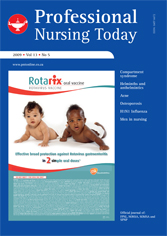Allergic rhinitis and pregnancy – A Review of the literature, with recommendations for management
Keywords:
Allergic rhinitis and pregnancy
Abstract
• The concurrence of allergic rhinitis and pregnancy is common. • The diagnosis of allergic rhinitis is easily and reliably made, by eliciting the characteristic symptoms on history. • This diagnosis is easily confirmed by using the radioallergosorbent test (RAST) or enzyme-linked immunosorbent assay (ELISA) tests. • Nasal symptoms, particularly obstruction, are often aggravated in pregnancy, through several possible mechanisms. • Untreated allergic rhinitis and nasal obstruction affect the quality of life and can impact on the lower airways particularly in the presence of asthma, and indeed on the pregnancy itself. • The effective management of allergic rhinitis in pregnancy is thus important and can be undertaken in complete safety, and the pregnant patient should not be made to suffer the symptoms. • Management should be tailored to the needs of the patient, and should be the minimum needed to control the condition. It can include: allergen avoidance; simple non-specific measures; local corticosteroid nasal sprays; oral antihistamines and immunotherapy. • At present there is no intervention in pregnancy that has been shown to reduce the incidence of atopy in offspring.
Issue
Section
Midwifery
By submitting manuscripts to PNT, authors of original articles are assigning copyright to Medpharm Publications (Pty) Ltd. Authors may use their own work after publication without written permission, provided they acknowledge the original source. Individuals and academic institutions may freely copy and distribute articles published in PNT for educational and research purposes without obtaining permission.

